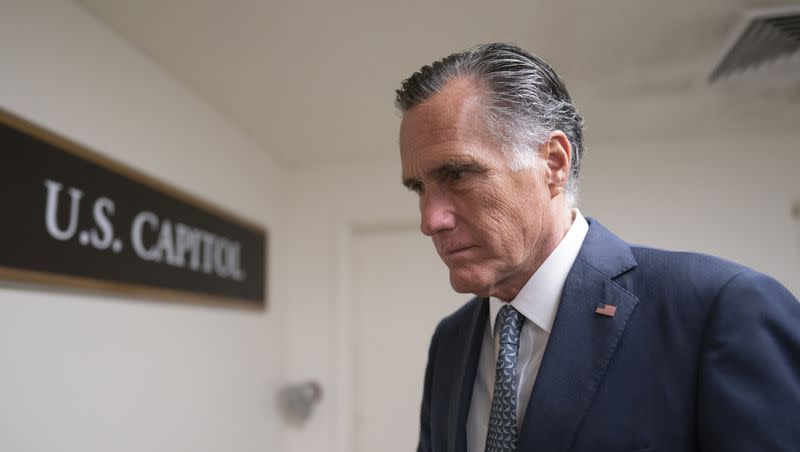Sen. Mitt Romney says he is ‘terrified about AI’

Sen. Mitt Romney spoke openly about his fears regarding artificial intelligence and the risk it poses to national security during a Senate committee hearing Tuesday.
“I’m in the camp of being more terrified about AI than I am in the camp of those thinking this is going to make everything better for the world,” said Romney, R-Utah, in his opening remarks. He is the ranking member of the Subcommittee on the Emerging Threats and Spending Oversight Subcommittee.
AI and smallpox
At an event in Utah last month, Romney said he sees AI “as more of a threat and a risk than as an opportunity,” speaking about the risk of deep fakes and the use of AI by countries that are adversaries of the U.S.
He described a terrifying scenario that could become a reality because of AI.
“It was pointed out in a briefing we received recently that right now there are about 100 scientists in the world that can duplicate the smallpox pathogen. But with AI, there’ll be a million people around the world that can duplicate the smallpox pathogen, and a lot of them are really bad people,” he said.
Romney said it would be very difficult for the government to regulate AI.
“The only idea that I’ve heard so far on AI that we might help us rein in the threat is doing a better job at determining who has the chips, the extraordinarily powerful chips that are necessary to run AI and limiting the exposure of those chips to certain countries,” he said.
Related
Artificial intelligence and bioweapons — a tricky balance
Sen. Maggie Hassan, D-N.H., the chair of the committee, also raised her concerns about the scenario Romney previously described, saying Congressional attention isn’t focused “on so-called ‘catastrophic’ risks posed by AI — such as the ability of AI to help terrorists develop and use unconventional weapons,” in her opening remarks.
At a Senate hearing in July, expert, Dario Amodei, chief executive of the AI company Anthropic, said that specific steps to create a bioweapon “can’t be found on Google or in textbooks and requires a high level of expertise.”
“We found that today’s AI tools can fill in some of these steps,” Amodei added, per Reuters.
Romney asked the expert witnesses at the hearing Tuesday what process would work to put any safeguards in place, and, “How much time do we have?”
Related
Gregory C. Allen, director of the Wadhwani Center for AI and Advanced Technologies, which is dedicated to policy research, said that from a regulatory standpoint, “We want to make it hard for malicious activity to happen, but we don’t want to ban all of these good activities as well.”
He said that in the case of biosecurity, AI made it easier to create bioweapons. Why? “Well, part of it is the nature of existing regulations,” Allen said.
For example, if someone wants to access the anthrax pathogen, which can be disseminated as a bioweapon, they can’t because it is on a list of regulated pathogens, he explained.
“The challenge with AI systems is that they could assist in the development of novel pathogens that are not on a list anywhere,” Allen continued.
But AI will also be necessary to help DNA synthesis companies detect a pathogen that didn’t exist before. This presents a tricky balance for regulators.
Related
Should a new federal agency regulate AI?
During his opening remarks, Romney said that the discussions he’s been a part of so far point out the need to “coordinate with other nations and perhaps have some kind of international consortium or international agreement that relates to AI.”
“I don’t know how that would work, where it would be housed, how we would initiate that, and whether that’s realistic,” he added.
Romney said there has also been talk of creating a separate agency or department — with a staff of experts — to oversee development in the industry, create strategies and counsel policymakers, such as himself.
“Frankly, a lot of, in my case, 76-year-olds are not going to figure out how to regulate AI because we can barely use our smartphones,” he said, asking if that would be a good idea.
While answering Romney’s questions related to putting safeguards in place, Jeff Alstott, a senior information scientist at Rand Corporation, a policy think tank and public sector consulting firm, said that most existing government agencies can handle the influence of AI on their sector.
Related
This includes self-driving cars under the purview of the Department of Transportation or the use of AI in health care overseen by Health and Human Services — but there are a few exceptions.
“One is that if someone is making or deploying an AI that is predictably going to get millions of people killed, there is no part of government that has clear responsibility for addressing that,” Alstott said. “So, that needs to be created.”
This could be done by establishing an independent agency, as Romney suggested. Or agencies with relevant authority — like the Department of Homeland Security, the Department of Commerce, and the Department of Defense — can also try to regulate and mitigate the effects of AI.
Contributing: Suzanne Bates

